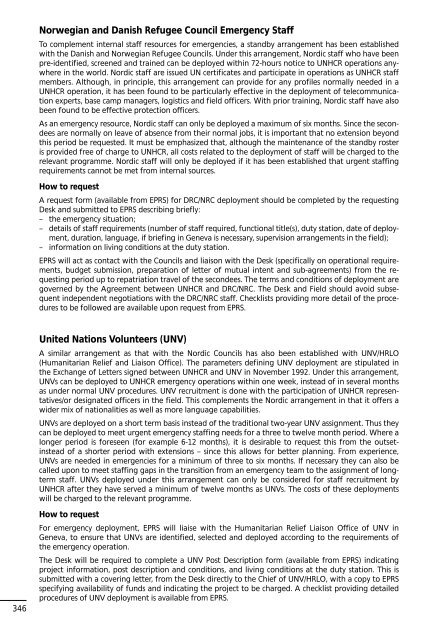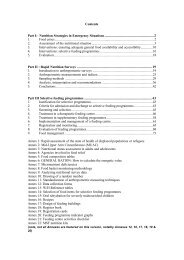UNHCR Handbook for Emergencies - UNHCR eCentre
UNHCR Handbook for Emergencies - UNHCR eCentre
UNHCR Handbook for Emergencies - UNHCR eCentre
Create successful ePaper yourself
Turn your PDF publications into a flip-book with our unique Google optimized e-Paper software.
346<br />
Norwegian and Danish Refugee Council Emergency Staff<br />
To complement internal staff resources <strong>for</strong> emergencies, a standby arrangement has been established<br />
with the Danish and Norwegian Refugee Councils. Under this arrangement, Nordic staff who have been<br />
pre-identified, screened and trained can be deployed within 72-hours notice to <strong>UNHCR</strong> operations anywhere<br />
in the world. Nordic staff are issued UN certificates and participate in operations as <strong>UNHCR</strong> staff<br />
members. Although, in principle, this arrangement can provide <strong>for</strong> any profiles normally needed in a<br />
<strong>UNHCR</strong> operation, it has been found to be particularly effective in the deployment of telecommunication<br />
experts, base camp managers, logistics and field officers. With prior training, Nordic staff have also<br />
been found to be effective protection officers.<br />
As an emergency resource, Nordic staff can only be deployed a maximum of six months. Since the secondees<br />
are normally on leave of absence from their normal jobs, it is important that no extension beyond<br />
this period be requested. It must be emphasized that, although the maintenance of the standby roster<br />
is provided free of charge to <strong>UNHCR</strong>, all costs related to the deployment of staff will be charged to the<br />
relevant programme. Nordic staff will only be deployed if it has been established that urgent staffing<br />
requirements cannot be met from internal sources.<br />
How to request<br />
A request <strong>for</strong>m (available from EPRS) <strong>for</strong> DRC/NRC deployment should be completed by the requesting<br />
Desk and submitted to EPRS describing briefly:<br />
– the emergency situation;<br />
– details of staff requirements (number of staff required, functional title(s), duty station, date of deployment,<br />
duration, language, if briefing in Geneva is necessary, supervision arrangements in the field);<br />
– in<strong>for</strong>mation on living conditions at the duty station.<br />
EPRS will act as contact with the Councils and liaison with the Desk (specifically on operational requirements,<br />
budget submission, preparation of letter of mutual intent and sub-agreements) from the requesting<br />
period up to repatriation travel of the secondees. The terms and conditions of deployment are<br />
governed by the Agreement between <strong>UNHCR</strong> and DRC/NRC. The Desk and Field should avoid subsequent<br />
independent negotiations with the DRC/NRC staff. Checklists providing more detail of the procedures<br />
to be followed are available upon request from EPRS.<br />
United Nations Volunteers (UNV)<br />
A similar arrangement as that with the Nordic Councils has also been established with UNV/HRLO<br />
(Humanitarian Relief and Liaison Office). The parameters defining UNV deployment are stipulated in<br />
the Exchange of Letters signed between <strong>UNHCR</strong> and UNV in November 1992. Under this arrangement,<br />
UNVs can be deployed to <strong>UNHCR</strong> emergency operations within one week, instead of in several months<br />
as under normal UNV procedures. UNV recruitment is done with the participation of <strong>UNHCR</strong> representatives/or<br />
designated officers in the field. This complements the Nordic arrangement in that it offers a<br />
wider mix of nationalities as well as more language capabilities.<br />
UNVs are deployed on a short term basis instead of the traditional two-year UNV assignment. Thus they<br />
can be deployed to meet urgent emergency staffing needs <strong>for</strong> a three to twelve month period. Where a<br />
longer period is <strong>for</strong>eseen (<strong>for</strong> example 6-12 months), it is desirable to request this from the outsetinstead<br />
of a shorter period with extensions – since this allows <strong>for</strong> better planning. From experience,<br />
UNVs are needed in emergencies <strong>for</strong> a minimum of three to six months. If necessary they can also be<br />
called upon to meet staffing gaps in the transition from an emergency team to the assignment of longterm<br />
staff. UNVs deployed under this arrangement can only be considered <strong>for</strong> staff recruitment by<br />
<strong>UNHCR</strong> after they have served a minimum of twelve months as UNVs. The costs of these deployments<br />
will be charged to the relevant programme.<br />
How to request<br />
For emergency deployment, EPRS will liaise with the Humanitarian Relief Liaison Office of UNV in<br />
Geneva, to ensure that UNVs are identified, selected and deployed according to the requirements of<br />
the emergency operation.<br />
The Desk will be required to complete a UNV Post Description <strong>for</strong>m (available from EPRS) indicating<br />
project in<strong>for</strong>mation, post description and conditions, and living conditions at the duty station. This is<br />
submitted with a covering letter, from the Desk directly to the Chief of UNV/HRLO, with a copy to EPRS<br />
specifying availability of funds and indicating the project to be charged. A checklist providing detailed<br />
procedures of UNV deployment is available from EPRS.



